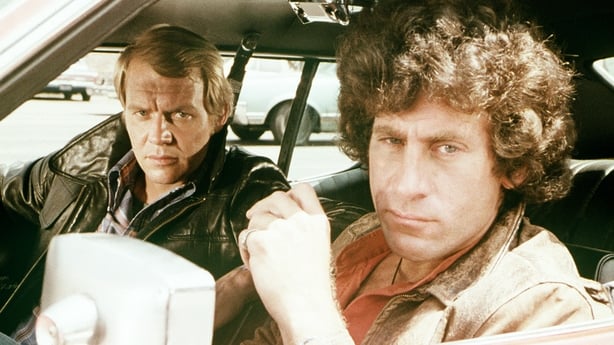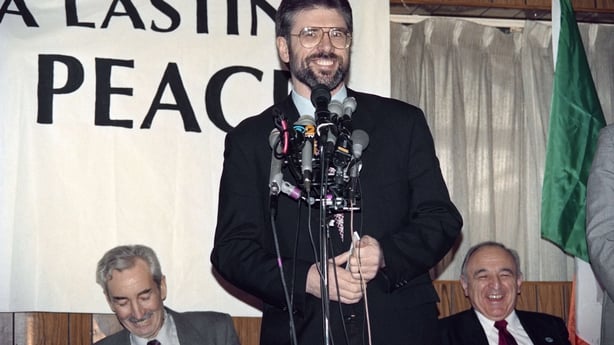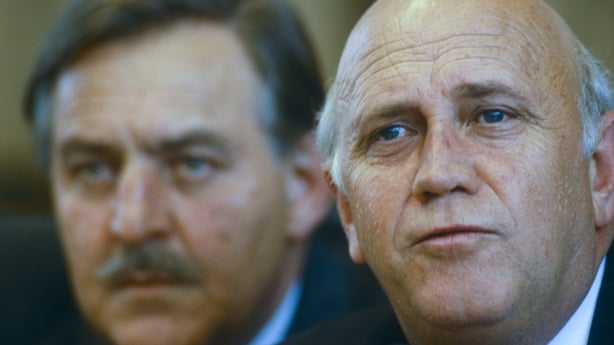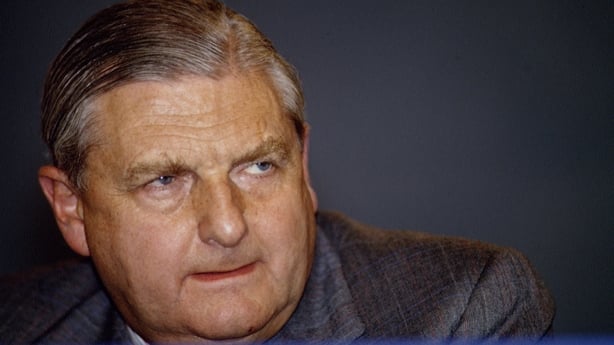By David McCullagh, Justin McCarthy and Fiachra Ó Cionnaith
1. Gift horses leave officials with long faces
There were long faces in Taoiseach Charles Haughey's office, when seven Desert Arabian horses gifted to Ireland by a wealthy American art dealer turned out to be duds.
Mr Haughey had the horses imported to Ireland and brought to the National Stud in 1989, in the hope of breeding them.
A special ceremony was arranged at which the Taoiseach would inspect the horses and formally take possession of them following the gift to the nation from the late Mr Vincent Melzac, a wealthy art dealer, whose wife had Irish connections.
Haughey described the horses as "magnificent" animals, in a glowing letter of thanks, when he first saw their photographs. But experts at the National Stud took a different view when they viewed them up close.
Far from being magnificent, they were, in fact, "quite inferior" according to an expert assessment.
The president of the British Arab Horse Society Finn McGuinness reported on a range of defects in the animals.
One had "a rather shapeless neck", another a "bad head", while a third had "weak hindlegs". Two of the horses were described as "quite nice ordinary animals" but were not up to the standard of a breeding stallion.
The manager of the National Stud John Clarke told officials that the stallions gifted by Mr Melzac would "not have any role to play in the stud’s plans" and it would be "totally uneconomic" to stand them there.
In the circumstances, Taoiseach Charles Haughey cancelled his plans for the high-profile acceptance and inspection ceremony at the National Stud, deciding that to go and view "inferior" animals would be an embarrassment.

In 1978, 11-year-olds were layabouts
Starsky and Hutch, Hawaii Five-O, and the Brady Bunch were the top TV choices of 11-year-olds in 1978, according to a document retained by the government of the day.
A copy of the Irish Broadcasting Review appears in State files released by the National Archives.
It features a survey of 720 children aged 11-years old, for whom, perhaps unsurprisingly, television viewing was their most popular leisure activity.
The only home-produced programme that featured in their top 20 choices was 'The Riordans'.
Almost half of the children surveyed only had access to one channel.
They were surveyed over a three-day period and cited their top three leisure activities as watching television, outings and "lying about" (for which they were presumably referred to as layabouts!)
Salty language in Salthill prompts high level action
A Californian-based couple visiting Salthill in 1978 were treated to some salty language when they happened upon an RTÉ crew which was filming a local band on the promenade.
According to a letter retained by the Department of Foreign Affairs, a Dr William Curtain enquired from the "girl member of the unit" if the film would be shown outside of Ireland. The letter states that the exact wording of her reply was "will you f**k off, we don't want sh**s like you around here!"
The doctor's father-in-law complained to both the Director General of RTÉ, and to the Minister for Foreign Affairs about the experience which he said had been "very painful for his daughter and her husband, who are, in many ways, splendid representatives of Ireland".
He proudly informed the minister that the couple hosted an annual St Patrick's Day function in their home which had become the "social event of the year".
Officials in the department promised to bring the letter to the attention of Minister Michael O’Kennedy on his return from official duties in Japan.
Contact was made by the department with RTÉ about the incident, and officials were told that the matter was "under investigation" but that enquiries suggested that the circumstances were not as stated in the letter.

FBI nearly put a stop to Adams trip
In 1995, while the first IRA ceasefire was still in place, FBI allegations that the IRA was trying to buy weapons in the US almost put paid to a fundraising trip by Gerry Adams.
The White House said it would be difficult in the light of the claims to over-rule objections by the FBI and the Department of Justice to granting Adams a visa.
But President Bill Clinton decided the visit was important as a confidence building measure and ordered that a visa should be granted.
British Prime Minister John Major was so annoyed that he subsequently refused to take a phone call from Clinton.
Keep her in check
The British were also annoyed at the prominent role played by the American Ambassador to Dublin, Jean Kennedy Smith.
British Cabinet Secretary Sir Robin Butler was one of those who "resented" the Ambassador.
He asked Irish official Séan Donlon "if there was nothing we could do to keep her in check".
The Estonian connection
The term "fake news" wasn't widely used in 1996, but Estonia blamed Russian misinformation for claims that the IRA were buying weapons in the Baltic state.
In May 1996, Russian news agency TASS claimed the IRA was buying former Soviet arms from Estonia, including high-powered sniper rifles, heavy machine guns and explosives. The story cited sources in the Russian security agency, the FSB (formerly the KGB).
The Estonian Ambassador in Moscow assured his Irish counterpart that there was no truth in the story, blaming it on "the poor state of Russian-Estonian relations". Irish officials decided not to say anything, in order to avoid getting caught up in the row between Russia and Estonia "when the temperature in these countries' relations is already high".

Apartheid architect claims he wants to 'help' black people
South African President FW de Klerk tried to persuade Taoiseach Charles Haughey that lifting the ban on South African fruit and vegetables would help black people in his country.
De Klerk’s visit to Dublin in April 1991 – three years before he was succeeded by Nelson Mandela – was hugely controversial, but Haughey argued that de Klerk was helping to dismantle Apartheid and should be supported.
De Klerk tried to persuade the Taoiseach that lifting the ban on South African fruit and vegetables would benefit "many thousands of families (mainly black)".
A double Bushmills boycott
Bushmills Whiskey found itself subject to boycotts from both sides of the political divide in Northern Ireland in the mid 1990s.
Traditionally an exclusively Protestant firm, Bushmills had begun to change after being bought by Irish Distillers – but was still the target of a boycott because of alleged sectarian employment practices organised by the United Irish Societies in San Francisco from January 1996.
The company was very worried by the boycott and enlisted the help of the Department of Foreign Affairs to try to end it.
And then, it was hit by a ban by DUP Mayor of North Down, Ruby Cooling, after the company signed a sponsorship deal with the GAA.
Councillor Cooling had form in these matters – she later insisted on bringing her own tea bags to functions in Bangor Castle because she said Fair Trade tea tasted "foul".
Flying Visit
A casual invitation to visit Ireland put the Department of Foreign Affairs in a spin in early 1992 – because the people involved made it a special case.
The invitation had been extended in January 1992 by media magnate Tony O’Reilly to the President of Zimbabwe, Robert Mugabe, whose first wife had recently died.
President Mugabe decided to take up O’Reilly’s suggestion, though he unfortunately didn’t have his phone number.
His High Commissioner in London then contacted the Irish Embassy, looking for O’Reilly’s number, or, alternatively, for hotel recommendations.
The Ambassador thought he might have been angling for official hospitality for the President, which officials in Dublin didn’t think was possible at such short notice.
Fortunately, Tony O’Reilly was contacted and offered the President the use of his home, or luxury hotels, and even his private plane, during his trip to Ireland – much to the relief of the mandarins in Iveagh House.

Undiplomatic talks
Northern Secretary Sir Patrick Mayhew was the epitome of the patrician British politician, complete with plummy voice and exquisite manners.
In public, that is. In private, Mayhew could be less polite.
His frustration with unionist politicians was on display in the colourful language he used while meeting Irish ministers in September 1992.
DUP leader Ian Paisley senior was "this extraordinarily dated creature [who] should not be allowed to dictate a downward course in the talks", and whose dominance in the DUP was "resented" by younger party members like the "realist" Peter Robinson.
Mayhew’s assessment of the Ulster Unionist Party was even blunter: "they’re thick". And UUP MP Ken Maginnis was "a great monstrous butcher who extrudes a speech from his mincer".
